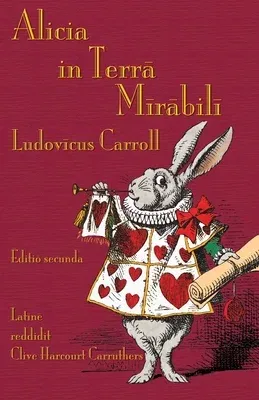Hōc in librō offertur lēctōrī nova ēditiō fābulae "Alicia in Terrā
Mīrābilī" in Latīnum annō 1964ō ā Clive Harcourt Carruthers conversae.
Differt ā prīmā ēditiōne duābus praecipuīs rēbus: cum quod discrīmen
nunc servātur inter "i" litteram vōcālem et "j" litteram vim cōnsonantis
habentem, tum quod omnēs vōcālēs longae sunt līneolīs superscrīptīs
ōrnātae. Omnium vōcālium longitūdinēs dīligenter exquīsītae sunt, etiam
in syllabīs positiōne longīs. In pauciōribus syllabīs, quārum vōcālium
longitūdinēs aut nunc incertae sunt, aut manifestē etiam antīquīs
temporibus vacillābant, vōcālēs sine līneolīs scrīptae sunt. Glōssārium
Latīnō-Anglicum in ultimō librō magnopere auctum est. Praeter ferē
vīgintī Neolatīna vocābula locūtiōnēsque, ut in prīmā ēditiōne, hoc
novum glōssārium etiam complectitur plūs ducenta vocābula antīqua
tīrōnibus inūsitātiōria. Spērāmus fore ut glōssāriō auctō multō plūrēs
lēctōrēs sine aliōrum lexicōrum ūsū ex hōc librō magnam capiant
voluptatem. -- In this book we present a new edition of Clive Harcourt
Carruthers' 1964 translation of "Alice's Adventures in Wonderland" into
Latin. It differs from Carruthers' original text chiefly in two ways: a
regular distinction between the vowel "i" and the consonant "j" has been
made, and long vowels are marked with macrons consistently throughout.
All vowels have been carefully investigated, including the vowels in
syllables long by position. In a few isolated cases where the classical
vowel lengths are in dispute, or where usage evidently vacillated, the
vowels have been left unmarked. The Latin-English glossary at the end
has been greatly enlarged. Instead of treating only a few Neo-Latin
words and phrases peculiar to this book, the extended glossary now also
covers over two hundred less common classical words. It is our hope that
this will enable a much larger group of our readers to enjoy Carruthers'
translation without having to resort to external dictionaries.


